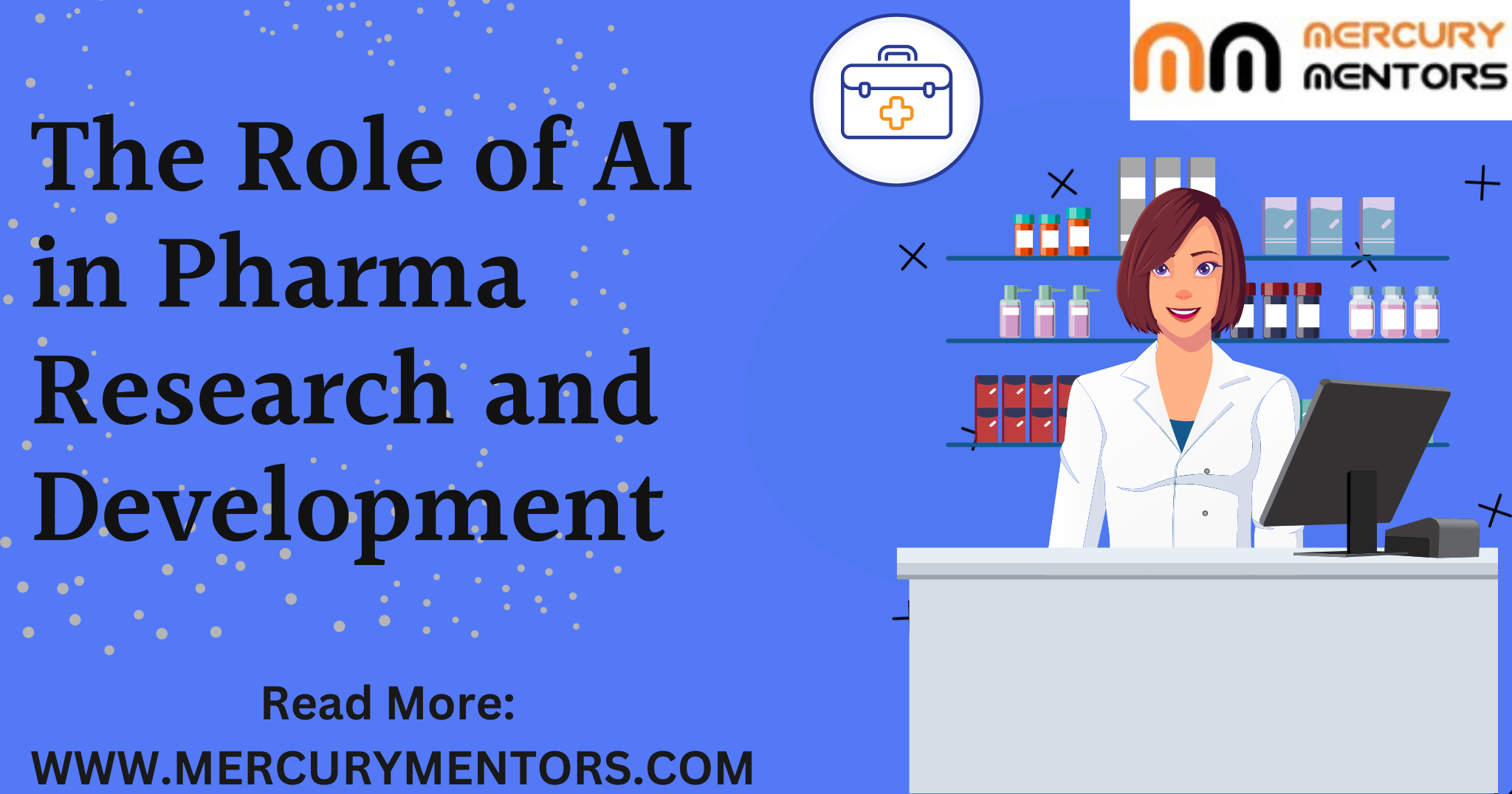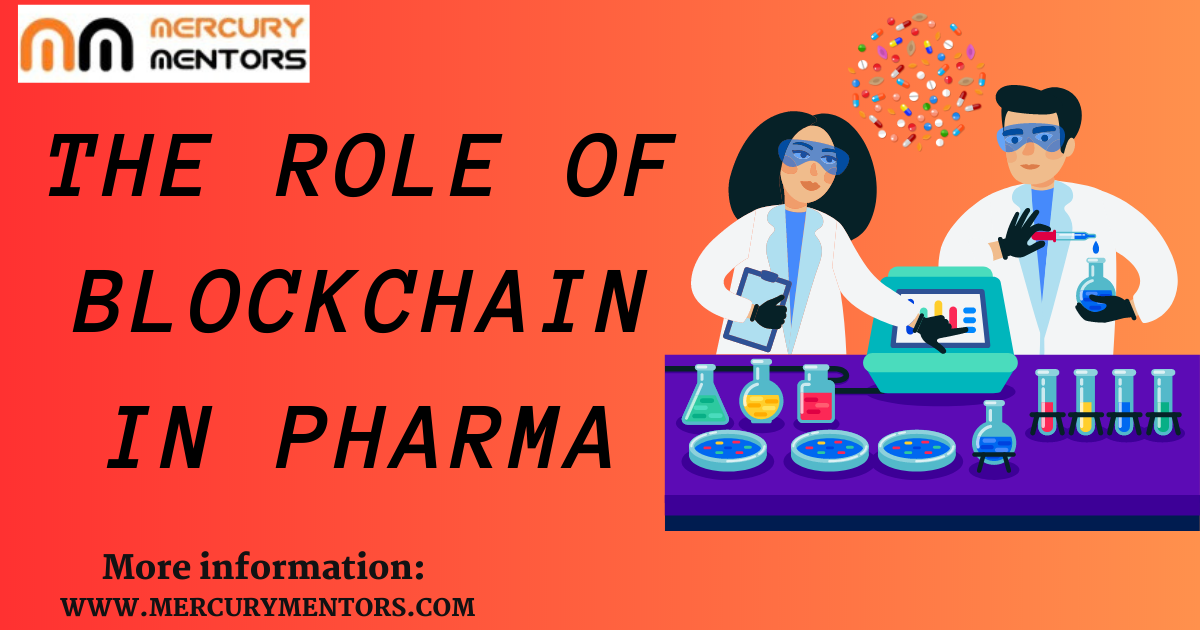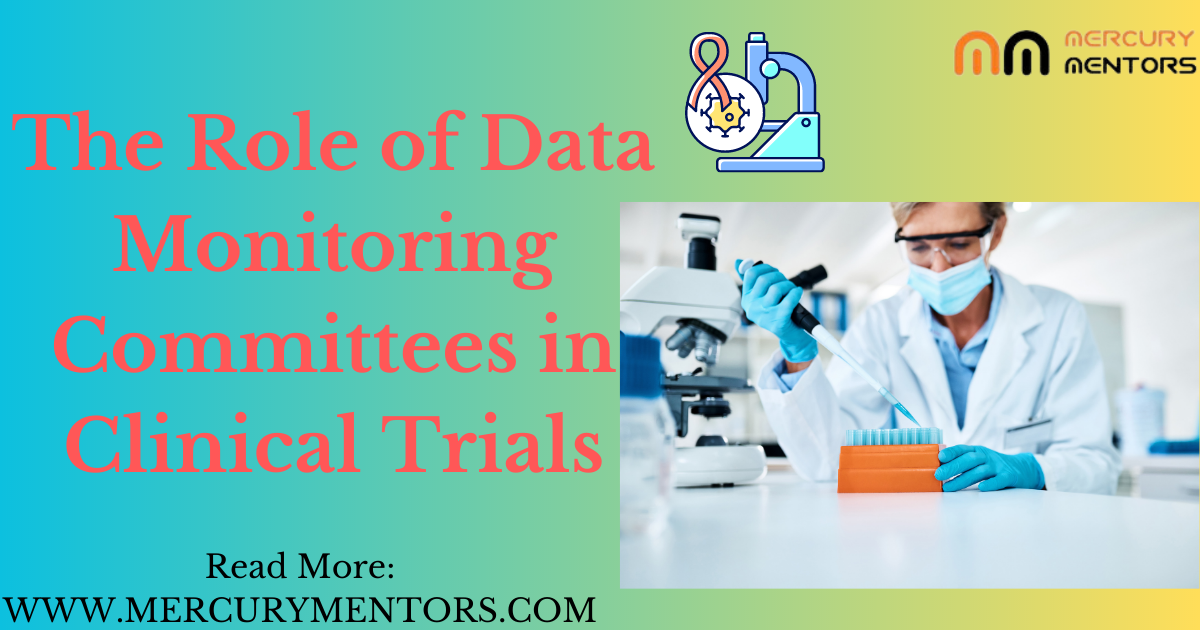Are you looking to Enroll in course?
Are you ready to take your skills to the next level? Enroll in our course today and unlock your full potential
Live Classes: Upskill your knowledge Now!
Chat Now
Created by - Admin s
Artificial intelligence (AI) has been revolutionizing various industries, and the pharmaceutical industry is no exception. In recent years, AI has become an essential tool in pharma research and development, and it has significantly contributed to the discovery of new drugs and the improvement of existing treatments. This blog will explore the role of AI in pharma research and development, its applications, and the benefits it offers.AI in Drug DiscoveryThe process of discovering new drugs is a lengthy and expensive one that can take years or even decades to complete. AI has the potential to speed up this process by analyzing vast amounts of data and identifying potential drug candidates. AI algorithms can predict the efficacy of drug candidates, assess the toxicity levels, and help researchers identify new targets for drug discovery.AI algorithms can also be used to analyze large datasets of genetic information, patient records, and other sources to identify patterns that may indicate potential new drug targets. This process, known as target identification, can help researchers focus their efforts on developing drugs that are more likely to be effective.AI in Clinical TrialsClinical trials are an essential part of drug development, but they are also time-consuming and expensive. AI can help streamline the clinical trial process by identifying patients who are more likely to respond positively to a drug and predicting potential side effects. This can help researchers design more efficient trials, reduce costs, and bring new drugs to market faster.AI can also be used to monitor patients in real-time during clinical trials, collecting data on a wide range of parameters such as blood pressure, heart rate, and other vital signs. This data can be used to identify adverse events early, allowing researchers to adjust the trial protocol and reduce the risk to participants.AI in Personalized MedicineOne of the most significant benefits of AI in pharma research and development is its potential to help develop personalized medicine. By analyzing vast amounts of genetic and other patient data, AI algorithms can identify patterns that may indicate which patients are more likely to respond positively to a particular treatment.This approach, known as precision medicine, can help reduce the risk of adverse events and increase the effectiveness of treatments. It can also help reduce healthcare costs by avoiding the use of treatments that are unlikely to be effective.ConclusionIn conclusion, AI has become an essential tool in pharma research and development, offering significant benefits in drug discovery, clinical trials, and personalized medicine. Its ability to analyze vast amounts of data quickly and accurately has the potential to speed up the drug development process, reduce costs, and improve patient outcomes. As AI technology continues to evolve, we can expect to see even more significant advances in the field of pharma research and development.
More detailsPublished - Thu, 23 Mar 2023

Created by - Admin s
The pharmaceutical industry is a highly competitive and rapidly evolving sector that focuses on the development of new drugs, therapies, and medical devices. Intellectual property (IP) is an essential tool for pharma companies to protect their innovations, investments, and research findings from being copied or used without permission. In this blog post, we will discuss the importance of intellectual property in the pharmaceutical industry.What is Intellectual Property (IP)?Intellectual property is a legal term that refers to the intangible creations of the human mind, such as inventions, artistic works, designs, and processes. IP can be protected through patents, trademarks, copyrights, and trade secrets. IP rights allow the owner to control the use, distribution, and reproduction of the protected asset for a limited period. In return, the owner can earn revenue, license the asset to others, and prevent competitors from copying their creation.The Importance of Intellectual Property in PharmaPharmaceutical companies invest billions of dollars in research and development (R&D) to create new drugs and treatments that can improve human health and save lives. The discovery and development of a new drug can take years of research, testing, and regulatory approval. Therefore, IP protection is crucial for pharma companies to recoup their investment, cover their costs, and continue to innovate.Encourages InnovationIP protection provides an incentive for pharma companies to invest in R&D and develop new drugs and therapies. Without IP protection, competitors could copy the drug formula, packaging, and marketing strategies, leading to decreased profits and revenue. Therefore, IP rights encourage pharma companies to take risks, invest in high-risk research projects, and create new medicines that can benefit patients.Provides Legal ProtectionIP protection provides pharma companies with legal protection against infringement and theft of their intellectual property. Patents protect the chemical composition and manufacturing process of drugs, while trademarks protect the brand name and logo. Copyrights protect the scientific data, research findings, and marketing materials. Trade secrets protect confidential information, such as clinical trial results, manufacturing techniques, and marketing strategies. IP protection enables pharma companies to take legal action against infringers and prevent them from profiting from their innovations.Generates RevenueIP protection enables pharma companies to license their patents, trademarks, copyrights, and trade secrets to others for a fee. Licensing agreements allow pharma companies to generate revenue from their intellectual property without having to produce, market, and distribute the product themselves. Licensing can also facilitate collaboration and knowledge sharing between pharma companies, leading to further innovation.Promotes CollaborationIP protection can encourage pharma companies to collaborate and share knowledge to accelerate the development of new drugs and therapies. Collaborative agreements can allow companies to combine their strengths, resources, and expertise to overcome research and development challenges. IP protection provides a legal framework for sharing confidential information, such as clinical trial results and research findings, without the risk of theft or infringement.ConclusionIn conclusion, intellectual property is crucial for the success and growth of the pharmaceutical industry. IP protection provides legal protection, encourages innovation, generates revenue, and promotes collaboration between pharma companies. Without IP protection, pharma companies would be less incentivized to invest in R&D, resulting in fewer new drugs and therapies for patients. Therefore, it is essential for pharma companies to understand and leverage the benefits of intellectual property to remain competitive and innovative in the fast-paced world of medicine.
More detailsPublished - Thu, 23 Mar 2023

Created by - Admin s
Patient advocacy refers to the process of promoting and protecting the rights and interests of patients in the healthcare system. In the pharmaceutical industry, patient advocacy has become increasingly important in recent years. The power of patient advocacy in pharma lies in its ability to improve patient outcomes, increase patient engagement, and foster more collaborative relationships between patients, healthcare providers, and pharmaceutical companies.Pharmaceutical companies have historically been viewed as profit-driven entities focused solely on developing and selling drugs. However, the rise of patient advocacy has challenged this perception, as patient advocates work to ensure that the needs and perspectives of patients are prioritized in the drug development process. By engaging with patient advocates, pharmaceutical companies can gain valuable insights into patient experiences and preferences, which can inform the development of more effective and patient-centered treatments.One of the key ways in which patient advocacy can empower patients is by promoting greater access to healthcare. This is particularly important in the case of rare diseases or conditions, where patients may struggle to access appropriate care or may not be aware of available treatment options. Patient advocacy groups can work to raise awareness of these conditions and advocate for increased funding for research and development.In addition to improving access to care, patient advocacy can also play a crucial role in shaping healthcare policy. By speaking out about issues that affect patients, such as the cost of medications or insurance coverage, patient advocates can influence policymakers and bring about meaningful change. For example, patient advocacy groups played a key role in advocating for the Affordable Care Act (ACA), which has helped to increase access to healthcare for millions of Americans.Another important aspect of patient advocacy is the role it can play in clinical trials. Patient advocates can work with pharmaceutical companies to ensure that clinical trial protocols are designed in a way that reflects the needs and preferences of patients. This can include advocating for greater patient representation on clinical trial design committees, as well as ensuring that trial data is shared in a transparent and accessible manner.Overall, the power of patient advocacy in pharma lies in its ability to bring patients to the forefront of the drug development process. By engaging with patient advocates, pharmaceutical companies can gain valuable insights into patient experiences and preferences, which can inform the development of more effective and patient-centered treatments. Additionally, patient advocacy can help to promote greater access to healthcare, influence healthcare policy, and ensure that clinical trials are designed in a way that reflects the needs and preferences of patients.In conclusion, patient advocacy is a vital component of the pharmaceutical industry. By empowering patients and promoting their interests, patient advocacy can help to improve healthcare outcomes, promote collaboration between patients and healthcare providers.
More detailsPublished - Thu, 23 Mar 2023

Created by - Admin s
Pharmacists play a critical role in the healthcare industry, providing a wide range of services to patients, physicians, and other healthcare providers. They are experts in the safe and effective use of medications, and they work to ensure that patients receive the best possible care. In this blog post, we will explore the various roles of pharmacists in healthcare and their impact on patient outcomes.Medication ManagementOne of the most significant roles of pharmacists in healthcare is medication management. Pharmacists work with patients and their healthcare providers to ensure that patients receive the right medications at the right time and in the right dose. They are responsible for ensuring that patients are taking their medications as prescribed and that they understand the importance of taking their medications consistently.Pharmacists also work to identify and resolve medication-related problems. They review patients’ medication regimens to identify potential drug interactions, adverse effects, and other issues that may compromise the safety and effectiveness of their treatment. They collaborate with healthcare providers to develop strategies for managing these issues and improving patient outcomes.Patient EducationPharmacists also play a critical role in patient education. They provide patients with information about their medications, including how to take them, what to expect, and what side effects to watch for. They also help patients understand the importance of medication adherence and the potential consequences of non-adherence.Pharmacists may also provide information about non-pharmacological treatments, such as lifestyle modifications and complementary therapies. They work to ensure that patients have a comprehensive understanding of their treatment options and can make informed decisions about their care.ImmunizationsPharmacists are also involved in the administration of immunizations. They are authorized to administer a wide range of vaccines and can provide patients with information about the importance of vaccination and the potential risks and benefits of different vaccines. Pharmacists play a critical role in promoting public health by helping to ensure that patients receive the immunizations they need to protect themselves and others from infectious diseases.Medication ReconciliationMedication reconciliation is the process of ensuring that a patient’s medication regimen is accurately and completely transferred between healthcare providers. This is particularly important when patients are transitioning from one healthcare setting to another, such as from a hospital to a long-term care facility or from a primary care provider to a specialist.Pharmacists are often responsible for medication reconciliation, as they have expertise in medication management and can identify potential issues with a patient’s medication regimen. They work with healthcare providers to ensure that the patient’s medication list is accurate and complete and that any medication-related issues are identified and resolved.ConclusionPharmacists play a critical role in the healthcare industry, providing a wide range of services that are essential to improving patient outcomes. They are experts in medication management, patient education, immunizations, and medication reconciliation, and they work collaboratively with other healthcare providers to ensure that patients receive the best possible care. As the healthcare landscape continues to evolve, pharmacists will continue to play an important role in promoting public health and ensuring that patients receive the care they need to lead healthy and productive lives.
More detailsPublished - Wed, 05 Apr 2023

Created by - Admin s
Pharmacy practice is a vital component of healthcare. Pharmacists are responsible for dispensing medications, counseling patients, managing drug therapy, and collaborating with other healthcare professionals. The ethical principles that govern pharmacy practice are critical in ensuring that patients receive safe, effective, and equitable care.The first ethical principle of pharmacy practice is autonomy. Autonomy means that patients have the right to make their own decisions about their healthcare. This principle requires pharmacists to respect the rights and dignity of patients, provide them with accurate and complete information about their medications, and involve them in decisions about their treatment. For example, pharmacists must obtain informed consent from patients before dispensing a medication or providing a clinical service.The second ethical principle of pharmacy practice is beneficence. Beneficence means that pharmacists have a duty to act in the best interests of their patients. This principle requires pharmacists to prioritize the health and well-being of their patients above all other considerations. For example, pharmacists must ensure that the medications they dispense are appropriate, safe, and effective, and that they do not harm their patients.The third ethical principle of pharmacy practice is non-maleficence. Non-maleficence means that pharmacists have a duty to avoid harming their patients. This principle requires pharmacists to be vigilant in detecting and preventing medication errors, adverse drug reactions, and other potential harms. For example, pharmacists must ensure that they do not dispense medications that may interact with other medications that the patient is taking or that may cause harm in patients with certain medical conditions.The fourth ethical principle of pharmacy practice is justice. Justice means that pharmacists have a duty to treat all patients fairly and equitably. This principle requires pharmacists to consider the needs and interests of all patients, regardless of their race, ethnicity, gender, religion, or socioeconomic status. For example, pharmacists must ensure that they provide access to medications and healthcare services to all patients, regardless of their ability to pay.The fifth ethical principle of pharmacy practice is veracity. Veracity means that pharmacists have a duty to be truthful and honest with their patients. This principle requires pharmacists to provide accurate and complete information to their patients about their medications, including their benefits, risks, and potential side effects. For example, pharmacists must ensure that they provide clear and concise instructions to patients on how to take their medications and what to do if they experience any adverse effects.In conclusion, the ethical principles of pharmacy practice are critical in ensuring that patients receive safe, effective, and equitable care. Pharmacists have a duty to uphold these principles and to prioritize the health and well-being of their patients above all other considerations. By adhering to these principles, pharmacists can help to build trust with their patients and promote the highest standards of pharmacy practice.
More detailsPublished - Wed, 05 Apr 2023

Created by - Admin s
Blockchain technology has been making headlines for years, but its potential applications in the pharmaceutical industry are only just beginning to be explored. From tracking the supply chain to ensuring the safety and authenticity of drugs, blockchain has the potential to revolutionize the pharmaceutical industry in ways that were previously unimaginable.The supply chain in the pharmaceutical industry is complex and involves multiple parties, including manufacturers, distributors, and retailers. Ensuring the authenticity of drugs is a critical concern, as counterfeit drugs can cause serious harm to patients. Blockchain technology can be used to create a transparent, tamper-proof record of each drug’s journey through the supply chain, from the manufacturer to the patient.By using blockchain to track the supply chain, pharmaceutical companies can improve efficiency and reduce costs. The technology can be used to automate many of the processes involved in supply chain management, such as inventory tracking, order fulfillment, and shipping. By doing so, blockchain can help to reduce errors, eliminate paperwork, and increase the speed of the supply chain.In addition to tracking the supply chain, blockchain can also be used to ensure the safety and authenticity of drugs. Each drug can be assigned a unique identifier, which is recorded on the blockchain. This identifier can be used to track the drug’s journey through the supply chain and ensure that it has not been tampered with or counterfeited.Another potential use case for blockchain in the pharmaceutical industry is in clinical trials. Clinical trials are a critical part of the drug development process, but they are often expensive and time-consuming. By using blockchain to securely store and share data, clinical trials can be conducted more efficiently and with greater transparency. This can help to reduce costs and speed up the development of new drugs.One of the key benefits of blockchain technology is that it is decentralized, meaning that there is no central authority controlling the network. This makes it difficult for hackers to infiltrate the system and steal data. In the pharmaceutical industry, this is particularly important, as sensitive patient data is often at risk of being hacked or stolen. By using blockchain to store and share data, pharmaceutical companies can ensure that patient data is secure and protected.In conclusion, the role of blockchain in the pharmaceutical industry is still in its early stages, but the potential applications are vast. By using blockchain to track the supply chain, ensure the safety and authenticity of drugs, and improve the efficiency of clinical trials, the pharmaceutical industry can benefit from increased transparency, reduced costs, and improved patient safety. As blockchain technology continues to evolve, it is likely that we will see even more innovative uses in the pharmaceutical industry in the years to come.
More detailsPublished - Wed, 05 Apr 2023

Created by - Admin s
Clinical trials are complex and time-consuming processes that require a significant amount of resources, including financial, human, and time. They are designed to test new treatments, drugs, and medical devices, and they play a crucial role in advancing medicine and improving patient outcomes. However, clinical trials also involve risks, and it is essential to ensure that they are conducted safely and effectively. This is where data monitoring committees (DMCs) come in.A DMC is an independent group of experts who are responsible for monitoring the safety and efficacy of a clinical trial. They provide oversight and guidance to the trial's sponsor, ensuring that the trial is conducted in accordance with ethical standards and regulatory requirements. DMCs are typically composed of medical and statistical experts who have experience in clinical trial design and analysis.The role of a DMC begins before the start of a clinical trial. They are involved in the trial's planning phase, where they review the study design, the patient population, and the statistical methods used to evaluate the results. They also develop a monitoring plan that specifies the timing and frequency of safety and efficacy assessments during the trial.During the trial, the DMC reviews the data collected at predefined intervals to determine whether the trial should continue, be modified, or be terminated. They look for any safety concerns or unexpected adverse events that may indicate a risk to patient safety. They also assess the efficacy of the treatment being tested, looking for any indications that the treatment is working or not.If the DMC identifies a safety concern or efficacy issue, they may recommend that the trial be modified or terminated. For example, if a new drug is causing severe side effects, the DMC may recommend that the trial be terminated early to protect patient safety. Alternatively, if the treatment is showing significant efficacy, the DMC may recommend that the trial be expanded to include more patients.The DMC's role does not end when the trial is completed. They also review the final results of the trial, ensuring that the data analysis is accurate and unbiased. They provide a final report to the sponsor, which includes recommendations for further studies, modifications to the treatment protocol, or additional safety monitoring.Overall, the role of a DMC is critical to the success of a clinical trial. They provide independent oversight and guidance, ensuring that the trial is conducted safely and effectively. By monitoring the safety and efficacy of the trial, they help to protect patient safety, advance medical knowledge, and improve patient outcomes. Therefore, the formation of DMCs is highly recommended to ensure clinical trials are conducted effectively and ethically.
More detailsPublished - Wed, 05 Apr 2023

Created by - Admin s
Clinical trials are an essential part of the drug development process, providing valuable information about the safety and effectiveness of new treatments. However, the decision to participate in a clinical trial can be a difficult one for patients, as they weigh the potential benefits against the risks involved. In this blog, we will discuss the benefits and risks of participating in clinical trials.Benefits of Participating in Clinical Trials:Access to new treatments: Clinical trials give patients access to new and innovative treatments that may not be available through standard care. These treatments may be more effective than existing options or may offer better outcomes with fewer side effects.Contributing to medical research: By participating in a clinical trial, patients play a vital role in advancing medical knowledge and improving patient care. Clinical trials help researchers learn more about the disease and develop better treatments for future patients.Close medical monitoring: During a clinical trial, patients receive close medical monitoring from a team of healthcare professionals. This can lead to early detection of any potential side effects or complications and allow for prompt intervention.Potential financial benefits: In some cases, patients may receive financial compensation for their participation in a clinical trial. This can help offset the costs of treatment or provide additional income.Risks of Participating in Clinical Trials:Unknown side effects: Clinical trials involve testing new treatments, which means that there may be unknown side effects that have not yet been identified. This can be a significant risk for patients who are already dealing with a serious illness.Potential for ineffective treatment: Not all treatments tested in clinical trials will be effective, which means that patients may receive a treatment that does not provide any benefit.Inconvenience and time commitment: Clinical trials can be time-consuming and require patients to make frequent visits to the study site for testing and monitoring. This can be a significant inconvenience for patients and their families.Uncertainty about treatment allocation: In some clinical trials, patients may be randomly assigned to a treatment group, which means that they may not receive the treatment they were hoping for.Conclusion:Participating in a clinical trial can be a difficult decision for patients, as they weigh the potential benefits against the risks involved. However, clinical trials play an essential role in advancing medical knowledge and improving patient care. By participating in a clinical trial, patients can gain access to new and innovative treatments, contribute to medical research, and receive close medical monitoring. It is important for patients to carefully consider the risks and benefits of participating in a clinical trial and to discuss their options with their healthcare provider.
More detailsPublished - Wed, 05 Apr 2023

Created by - Admin s
Tell me about a time you failed. How did you handle it?This question is usually asked in order to see how you overcome adversity and if you take responsibility for your actions. The key here is to also share what you learned from the experience.Past Failure Situational Interview Question Example AnswerDuring my first month as social media manager, I posted an infographic that I downloaded from the internet. I didn’t check it carefully and got a call from our CEO asking why my post had profane language. I looked closer and sure enough, there were some curse words in the infographic. I apologized profusely and immediately took it down. I’ve never forgotten to thoroughly read a post since then.Tell me about a time you had to work closely with someone you didn’t get along with. What did you do?Interviewers usually ask this question to see how you deal with conflict and work with others. Be sure to include the end result of your efforts in your answer.Dealing With Difficult People Situational Interview Question Example AnswerI had to work on a large project with another department head who was known for being difficult to please and work with. During our first meeting, I was intentional about forming a personal connection and setting our expectations for the project up front. We finished the project successfully, and now we have a strong working relationship.What would you do if you were asked to complete a task you’ve never done before?Your potential boss wants to know that you are willing to take on new challenges independently. Your answer to this question will also provide some insight into your problem-solving skills.New Task Situational Interview Question Example AnswerI would first get as many details as possible to make sure I had a clear understanding of what was needed. Then if it was a relatively straightforward task, I would do a quick internet search for a tutorial. If that wasn’t easy to find, in order to not waste time, I would ask either the person who assigned the task or another coworker for help.Tell me about a time you were in a high-pressure situation. How did you get through it?Interviewers usually ask this question to see how you work under pressure. They want to see that you know what steps you need to take in order to deliver.High-Pressure Situation Situational Interview Question Example AnswerI was assigned an important coding project that was due in a much shorter time frame than usual. I blocked out time in my schedule to work on it, asked for help when I needed it, and I made sure I got plenty of rest at home so that I would have the energy I needed to focus throughout the day. It took a lot of work, but I was able to successfully complete it.Describe a time you had to make a good impression on a client.Your answer to this question will provide insight about your work ethic and customer service skills. Use this opportunity to show how you go above and beyond in your work.Good Impression Situational Interview Question Example AnswerOne of my first high-profile clients was extremely particular. I showed him several design samples and asked what he liked or disliked about each one. Then I created three different design options and asked which one he liked best and what edits he wanted to make. He made minimal changes and was so pleased that I had taken the time to get to know his preferences that he hired me three more times.What accomplishment are you most proud of in your career? How did you achieve it?This question not only helps interviewers see what you’ve achieved, but it also shows them what you are most passionate about in your work. Just make sure your answer applies to the job you’re applying for as well.Proudest Accomplishment Situational Interview Question Example AnswerWhen I was teaching second grade, I noticed that students in one of my classes were struggling with their spelling tests. I made up some review games and rewarded them for any improvement in their test scores. Their average scores increased by 10% by the end of the year.Give me an example about a problem you observed and how you solved it.Your answer to this question will demonstrate your initiative and problem-solving skills. They want to see you’ll make valuable improvements without being asked.Problem Solving Situational Interview Question Example AnswerDuring my time as an administrative assistant, I noticed that we were ordering printer paper at an unusually high rate. I knew we had plenty hidden in the storage closet, so I rearranged it so that we could easily see where it was. We saved $300 in paper that year and always had some on hand.Describe a difficult client interaction you’ve had. What did you do?This question helps employers see your customer service skills in action. Make sure you’re as detailed as possible in your answer to show the steps you took and the end result of the interaction.Difficult Client Situational Interview Question Example AnswerA customer was upset that they hadn’t received our catalog yet. I apologized and explained that it had only been recently mailed out. I then offered to email them a PDF version so that they had it immediately along with a coupon for their next order. The customer accepted my offer and left a positive review on our website.Tell me about a situation when you had an especially heavy workload. What did you do?By asking this question, the interviewer is trying to gain insight into your organizational and time management skills. Make sure you share the specifics of how you got everything done.Heavy Workload Situational Interview Question Example AnswerDuring my time as a marketing assistant, we had several of our team members out sick at the same time that we had several projects due. By prioritizing tasks, setting personal deadlines, and communicating with my project team members about when I was going to get back to them, we got it all done on time.Give me an example of a difficult decision you had to make. What steps did you take to make it?The intent behind this question is relatively straightforward, as interviewers want to see your decision-making process. Because of this, be sure to outline the steps you took to make the decision.Difficult Decision Situational Interview Question Example AnswerWhen I worked as a project leader, we realized that an earlier mistake would cost us either the quality of the final project or require us to push back our deadline and miss our departmental goal for the month.I talked with our team to get their perspectives, asked my supervisor what she thought, and weighed the pros and cons myself. Ultimately, we all agreed to push back the deadline because one of the company’s values was excellence, and we knew that having a quality product would be more beneficial than getting it released on time.Say you’re working on a project with a tight deadline, and you’re waiting on something from a coworker who said that they’d get it to you last week. What do you do?This question is another one that is intended to get an inside look into your interpersonal skills. Make sure you share the steps you’d take and consider including the reasons behind each one.Meeting a Deadline Situational Interview Question Example AnswerI would contact this person and start the conversation by asking how they are doing, because you never know if they’re dealing with a crisis that is keeping them from getting back to you.I would then explain that I’m on a deadline for this project and that I really need that item to complete it. I would then ask if they could get it to me in the next day or two and offer to help.Tell me about a time when you disagreed with your boss. How did you handle it?An interviewer wants to know not only how you deal with conflict with your peers, but also with authority figures. Good employers will also want to know that you aren’t a mindless yes-man but are still respectful.Disagreement With Boss Situational Interview Question Example AnswerWhen we were setting new project goals for the year, I saw that one of them would not be attainable based on my personal knowledge of our clients. I went to my boss after the meeting and asked to talk about the goal.I explained that while I saw the reason for wanting to do it, I didn’t think it was the best fit for our particular clients. I shared my reasons why, and she ended up agreeing with me and thanking me for saving the department time and money.Give me an example of a goal you set for yourself and how you met it.Interviewers want to see that you are self-motivated and have the practical skills necessary to meet your goals. Make sure you outline the steps you took to meet them in your answer.Goal Setting Situational Interview Question Example AnswerAt the beginning of the year, I set a goal of doubling my sales. I attended trainings and asked for tips from successful salespeople. I calculated how many sales I’d need to make per month to meet my goal, and then how many contacts I’d need to make to do this. In the end, I was successful in reaching my goal.Tell me about a time when you had to explain something to a frustrated coworker or client. How did you do this, and what was their response?Your answer to this question will reveal more about not only your interpersonal skills, but also your communication skills. This is another one where you should always include the results of your efforts.Communication Skills Situational Interview Question Example AnswerI had a new client call me, frustrated about why we couldn’t get a customized product to him by the next day. I explained that while we would love to be able to do this, even if someone started on their product immediately, the materials we used would have to set for two days before it could be shipped.The client was understanding and appreciated that I had taken the time to explain this to him.Tell me about a challenge or conflict you’ve faced at work.Your potential employer wants to know that you will work to overcome challenges instead of running from them. This is your opportunity to demonstrate how you do this.Overcoming Challenges Situational Interview Question Example AnswerDuring my first year of teaching, my students would always come to my class after lunch rowdy and unfocused. After a few months of trying to teach through the noise, I decided to look up some creative methods to help them focus.I created a fun, simple workout routine to do in unison when they first got to class. This helped them burn energy and dial in, and our afternoons went much more smoothly.
More detailsPublished - Fri, 16 Jun 2023

Fri, 16 Jun 2023

Fri, 16 Jun 2023

Fri, 16 Jun 2023
Write a public review